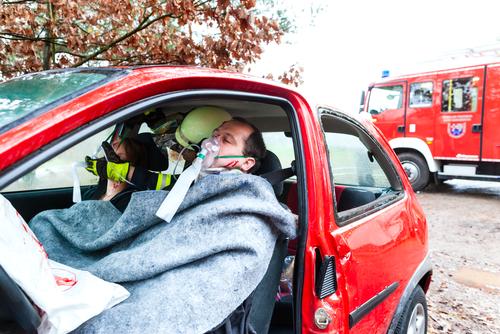According to the CDC, it is estimated that car crash injuries are becoming the eighth leading cause of death globally, regardless of gender or age. The situation is more concerning in the USA, where car accidents are among the leading causes of death. Over 32,000 people are killed and 2 million people are injured in car accidents in the United States each year.
With these facts in mind, you should stay informed about the current road safety rules and refrain from dangerous or irresponsible behavior when you are behind the wheel. Always have a plan in place if you are in this challenging situation.
If you suffer severe injuries, you must understand how to communicate with your insurance company, protect your interests, and know which attorney to contact before taking action. If you want to learn more about what you should do after a car accident, visit this website and get more information.
What Can Happen in a Car Crash?
Injuries from a car accident can range from minor bruises to life-threatening affection. It all depends on the intensity of the crash, weather conditions, and individual factors, which can affect everyone differently.
For example, women are more vulnerable in car accidents because passive safety devices have been designed for male bodies and proportions. Because of this, injuries will differ enormously from case to case. However, some are more common than others. Here are some of the most common injuries in car accidents:
Whiplash
The most common type of car injury is whiplash. Unlike broken bones, this injury involves soft tissue damage around the neck. It is caused by forceful neck movement in back-and-forth directions, typically during motor vehicle collisions.
It is usually not severe, with victims recovering in just a few weeks of pain medication and exercise. However, it affects people differently, with the elderly sometimes never fully recovering from whiplash.
Fractures and Broken Bones
The most common causes of hospitalization for car accident victims are broken or fractured limbs. Depending on the severity, they may require a cast and kinetic therapy or even an entire surgical operation for replacement and repair. Recovering from these car accident injuries can be an arduous process. Some people find themselves suffering in a car accident case even years after it.
Joint and spinal cord injuries
The human body is not made to handle an intense crash, which is why spinal and joint injuries are one of the most common auto accidents. Depending on the case, they can range from local pain to entire-body paralysis. The spine is delicate. If the nerves are affected, it can cause permanent disability.
Back and joint injuries can be complicated since they can appear later in life but cause similar damage. They are examples of delayed injuries from car accidents. For example, back problems can significantly affect people’s working ability, but since they appear later in life, insurance companies use this to deny or delay their claims.
Burns, Scars, and Disfigurement
If your car does not catch on fire after impact, you can still suffer from burns or disfigurement. Hot drinks, chemicals, broken glass, and impact on any hard surface can cause severe wounds and lacerations that require surgery and skin grafting.
Another skin-related injury is known as “road rash.” This bruise is an abrasion caused by friction with the pavement or concrete. While it can be painful, it usually goes away in two weeks and will not leave a scar.
Organ Damage and Internal Hemorrhage
Another severe injury is internal damage to the organs and the blood system. Invisible to the eye, these types of injuries require emergency medical treatment. Every moment is essential for the victim’s survival, so call an ambulance if someone has a concussion or experiences symptoms like slurred speech, confusion, and body weakness.
Organ failure can happen if the impact is so severe it crushes the victim’s internal system. If this happens, the injury may become fatal, but an emergency medical examination is required to determine that. Organ failure can also occur immediately after the collision or moments after, so call an ambulance as soon as possible.
Traumatic brain injuries (TBI)
Brain-related injuries are the most severe injuries that can result from car crashes and have the highest chance of becoming fatal. The brain is a vulnerable organ, and any damage, even minor, can have life-altering consequences. It can affect the victims’ cognitive ability, mobility, coordination ability, and even memory and sanity.
TBIs are serious injuries, so seek help immediately after the accident. Sometimes, it can be deadly if it is not discovered in time. For example, minor headaches are the first symptoms indicating brain bleeding, which can cause infestation and tumors in a short amount of time.
Post Traumatic Stress Disorder
Also known as PTSD, this mental affection affects most car crash victims. Most victims develop anxiety and fear of driving. These can lead to insomnia, panic attacks, and the development of paranoia. Unlike physical injuries, mental disorders may never fully heal, which can further traumatize victims for the rest of their lives.
What To Do If You Get Seriously Injured In A Car Accident
Knowing the first few steps to take may save your life and that of others. Keep these things in mind in case you get into one:
- The first and most critical step is to call 911 or the emergency services number in your country. If you are conscious and can use your phone, do this to provide your location and a description of the accident, including the number of vehicles involved and the nature of your injuries.
- Try to remain as calm as possible. Avoid moving unless you are in immediate danger (e.g. if your vehicle is on fire or in a hazardous location).
- If you can move safely, check on other individuals involved in the accident, especially passengers in your vehicle. But don’t attempt to help them if you can’t do so without worsening your condition.
- When emergency responders arrive, cooperate fully with their assessments and follow their medical advice. Paramedics may ask questions about your condition, provide necessary treatments like immobilizing your spine, and transport you to the nearest hospital for further evaluation and treatment.
- After your initial treatment, follow the medical recovery plan outlined by your healthcare providers. Maintaining your auto accident treatment will be crucial to reducing the risk of permanent disability, rehospitalization, or relapse.
- If someone else’s negligence caused the accident, consider contacting an attorney specializing in personal injury cases. Compensation can help you avoid major losses from your medical expenses or lost wages.
Still, the greatest form of cure is prevention. Stick to road laws, fasten your seatbelts well, respect the right of way, and don’t put yourself, your passengers, and other drivers at great risk.







